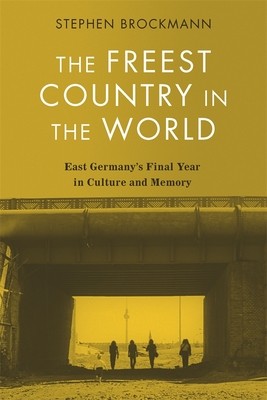
- We will send in 10–14 business days.
- Author: Stephen Brockmann
- Publisher: Camden House (NY)
- ISBN-10: 1640141545
- ISBN-13: 9781640141544
- Format: 15.2 x 22.9 x 2.1 cm, kieti viršeliai
- Language: English
- SAVE -10% with code: EXTRA
Reviews
Description
Shows that while the GDR is generally seen as - and mostly was - an oppressive and unfree country, from late 1989 until autumn 1990 it was the "freest country in the world" the dictatorship had disappeared while the welfare system remained.
Stephen Brockmann's new book explores the year 1989/1990 in East Germany, arguing that while the GDR is generally seen as - and was for most of its forty years - an oppressive and unfree country, from autumn 1989 until the autumn of 1990 it was the "freest country in the world," since the dictatorship had disappeared while the welfare system remained. That such freedom existed in the last months of the GDR and was a result of the actions of East Germans themselves has been obscured, Brockman shows, by the now-standard description of the collapse of the GDR and the reunification of Germany as a triumph of Western democracy and capitalism.Brockmann first addresses the culture of 1989/1990 by looking at various media from that final year, particularly film documentaries. He emphasizes punk culture and the growth of neo-Nazism and the Antifa movement - factors often ignored in accounts of the period. He then analyzes three later semiautobiographical novels about the period. He devotes chapters to dramatic films dealing with German reunification made relatively soon after the event and to more recent film and television depictions of the period, respectively. The final chapter looks at monuments and memorials of the 1989/1990 period, and a conclusion considers the implications of the book's findings for the present day.
EXTRA 10 % discount with code: EXTRA
The promotion ends in 23d.14:13:50
The discount code is valid when purchasing from 10 €. Discounts do not stack.
- Author: Stephen Brockmann
- Publisher: Camden House (NY)
- ISBN-10: 1640141545
- ISBN-13: 9781640141544
- Format: 15.2 x 22.9 x 2.1 cm, kieti viršeliai
- Language: English English
Shows that while the GDR is generally seen as - and mostly was - an oppressive and unfree country, from late 1989 until autumn 1990 it was the "freest country in the world" the dictatorship had disappeared while the welfare system remained.
Stephen Brockmann's new book explores the year 1989/1990 in East Germany, arguing that while the GDR is generally seen as - and was for most of its forty years - an oppressive and unfree country, from autumn 1989 until the autumn of 1990 it was the "freest country in the world," since the dictatorship had disappeared while the welfare system remained. That such freedom existed in the last months of the GDR and was a result of the actions of East Germans themselves has been obscured, Brockman shows, by the now-standard description of the collapse of the GDR and the reunification of Germany as a triumph of Western democracy and capitalism.Brockmann first addresses the culture of 1989/1990 by looking at various media from that final year, particularly film documentaries. He emphasizes punk culture and the growth of neo-Nazism and the Antifa movement - factors often ignored in accounts of the period. He then analyzes three later semiautobiographical novels about the period. He devotes chapters to dramatic films dealing with German reunification made relatively soon after the event and to more recent film and television depictions of the period, respectively. The final chapter looks at monuments and memorials of the 1989/1990 period, and a conclusion considers the implications of the book's findings for the present day.


Reviews